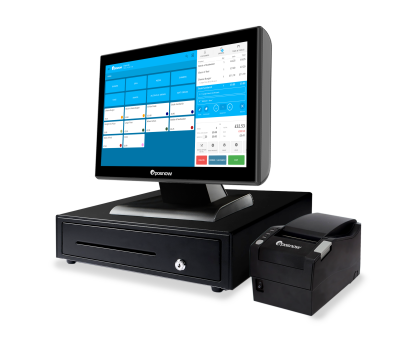Restaurant Operations Management: The Ultimate Guide
From the outside, managing a restaurant may seem like an enviable job. Those who don't work in the hospitality industry may imagine that a restaurant manager's day to day tasks mostly involve trying new dishes, visiting farmer's markets, and walking from table to table while placing a benevolent hand on their regulars' shoulders during the evening service.
The reality of restaurant operations management is a completely different story. In a working restaurant, there are a hundred little daily operations that all need to get done as quickly as possible. Restaurant managers are responsible for the entire business and need to be adept at spinning multiple plates at once.
To keep a restaurant running smoothly, a manager must have several different skills. The skills needed for good restaurant operations involve staff management, customer service, food knowledge, and financial management. These skills have a lot of crossover with other hospitality sectors, including hotel operations management and bar management.
Managers are an integral part of the restaurant business and are one of the most important people in the establishment. Between head chefs and restaurant owners, managers make a huge difference in how the business is run. Oftentimes, a good manager can make the difference between success and failure.
Good restaurant operations management can be difficult to get right and even harder to implement. In this blog, we'll be exploring the importance of operations management in the restaurant industry and share some helpful tips managers can use to improve restaurant operations management in their business.
What is restaurant operations management?
In practice, restaurant operations management can be very complicated but it is easy to define. Restaurant operations management refers to the process of overseeing a restaurant's daily tasks and operations.
Restaurant management is carried out by a manager. These managers will oversee the employees and the business as a whole. Depending on the size of the restaurant, there can be multiple managers in one company who will often alternate shifts. In many restaurants, the manager will also be the restaurant owner.
There are many different aspects of restaurant operations and it's up to the manager to ensure that the needs of the business are met. The more successful operations are carried out each day, the more the manager will improve the restaurant's operational efficiency.
The restaurant owner or manager is also responsible for developing and implementing a restaurant operations management strategy. This strategy guides how the restaurant approaches and overcomes its daily challenges. A good strategy can make a world of difference and vastly improve restaurant operations management.
Why is operations management important?
In short, good operations management is what sets good restaurants apart from bad restaurants. A restaurant without proper operations management may get by day to day but inefficiencies will inevitably slip in. left unchecked, these inefficiencies will snowball until they become impossible to deal with and drag the business down.
Inefficiencies such as food waste or improper scheduling can cost the restaurant money that could have otherwise been invested back into the business. A competent manager (or one assisted by a smart hospitality point of sale [POS] system) will be able to eliminate these issues before they become a much bigger problem.
On a more personal level, managers with good operational strategies create a better place to work for their team. The restaurant business is fundamentally based around the people in the back and front of house working together to provide excellent service. The more content your staff members are with their work, the higher the food quality they'll produce and the harder they'll work to increase customer satisfaction.

Gain all the advantages of a EPOS system with detailed, flexible, downloadable reports, and so much more:
- Manage and update products quickly with easy-to-use software
- Expand your business into multiple channels and integrate with a variety of online platforms
- Manage multiple locations and salespoints with multi-site management
- Keep queues short with streamlined, modifiable sales processes
- Choose a setup that suits you with software and hardware options
Tips for management success in the restaurant business
As we've already established, keep a restaurant running properly takes a lot of care and skill. The humble restaurant manager is often the first port of call when something goes wrong and expected to fix mistakes almost as soon as they happen.
To help managers stay on top of operations management, we've compiled a list of helpful tips. These tips cover the basics of what keeps a restaurant healthy and operating smoothly.
Build a culture of trust
The restaurant industry is full of big personalities and ideas. If you're not paying attention, it can be easy to forget that your team of staff members is the real heart of the business. Without the front and back of house teams, your restaurant would fall apart and your diners wouldn't see a single dish.
The lower levels of the hospitality industry, servers and line cooks for example, is known for having a particularly high turnover rate. Workers in these roles often see these jobs as stepping stones to other positions or something to hold them over while they pursue careers in other industries.
It is the duty of the restaurant owner or manager to build strong professional with the staff. If your team are made to feel like their opinions and needs are heard, they'll be more invested in the restaurant. This trust between manager and team member can do a long way to improving overall restaurant operations.
Properly manage your inventory usage and cut down on food waste
Without the proper ingredients, your kitchen won't be able to deliver delicious meals to your customer base. Without food, you won't be able to hold a dinner service and your restaurant sales will plument. For this reason, managing your food inventory is incredibly important to continued restaurant operations.
While fresh ingredients produce high quality food, if they're not managed properly they can quickly spoil. While it's inevitable that some ingredients will occasionally spoil, this should be avoided as much as possible. Food waste can be a big expense with absolutely no return for a restaurant.
If done manually, food inventory management can take hours. For maximum efficiency, managers should user inventory software. This software can be found in restaurant management software like the Epos Now Hospitality POS. This innovative piece of technology catalogues your entire inventory and updates it in real time so you know exactly what you have in stock.
An Epos Now Hospitality system also allows you to track your most and least popular menu items with historical sales data. With this information, you can make informed decisions about your menu and adjust it to maximize profits. This will reduce food waste as you will only order in what you need.
Cut down on labor and food costs
All but the most successful restaurants operate on a very tight profit margin. Restaurant owners are always looking for ways to make cost savings, often by cutting the budget. The difficulty for managers is walking the line between keeping costs low while maintaining quality food and service.
Food, labor, rent, and insurance are the biggest expenses for any restaurant. While you may be able to negotiate rent and insurance costs, they are generally difficult to adjust. Managers have much more power to affect labor and food costs.
As we've mentioned above, improper restaurant inventory management can lead to food waste. Spoiled food represents wasted money so make sure you get it under control. Take time each morning to go through how you're storing food and check your inventory levels with your POS system and ensure you're using what you have. This will help save money while also improving food safety.
Wasted ingredients aren't the only source of food cost. Sit down with your chef and go through your inventory costs including wholesaler prices and other food suppliers. While you should avoid buying lower-quality ingredients, you may be able to find better deals with different sellers.
While cutting food costs is relatively straight forward, cutting labor costs is much harder to get right. Your restaurant staff do much more than serving meals and it's important to maintain a good professional relationship. This means that you can simply let a few team members go when you want to give the budget a bump.
To save on labor costs, you need to put an operations plan in place and stick to it. Ensure you build schedules so that you only have who you need for that shift. Scheduling software in your POS system can be a big help with this. You should also avoid hiring more help than you need. You can make a good estimate of how much staff you need by looking at your sales trends and sales forecasts.
Train your staff to a high standard.
Like many hospitality businesses, restaurants rely on good word of mouth to spread the word about them and lure new customers in. This means that every time a dinerr walks into your restaurant, they need to have a positive customer experience.
The main way you can provide this positive experience is by training each and every staff member to a high standard. Your servers need to know how to greet customers, serve meals, and remember dietary restrictions for their tables. Your kitchen staff need to improve their knife skills, have a confident prep process, and pitch in where needed.
Work with your staff and get to know their strengths and weaknesses. Once you have this information you can build training programs that will help them be better in their role. You should also sit down with them and learn what they need from the business. Your staffs' productivity is closely related to their skills.
The best POS system for restaurant owners
Restaurant operations management is a difficult process to master. Luckily, modern technology allows managers to automate the majority of the their processes. This gives them more time to focus on the business and make it as successful as possible.
Investing in a great POS system is the best thing you can do to improve restaurant operations management. The Epos Now POS solution for restaurants is the best hospitality and retail POS system on the market.
The Epos Now Complete solution comes with everything you need to start trading including a touchscreen terminal, a cash draw, and a receipt printer. Epos Now customers also get access to payment processing services, advanced business tools, and a suite of award-winning apps.
If you're interested in learning more about Epos Now, get in touch with our expert team below.



